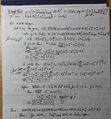Difference between revisions of "A sequence consisting of the nth terms of the sequences in a Cauchy sequence of elements in any little-L space is itself a Cauchy sequence of complex numbers"
From Maths
(Created page with "{{DISPLAYTITLE:A sequence consisting of the {{M|n^\text{th} }} terms of the sequences in a Cauchy sequence of elements in any {{M|\ell^p}} space is itself a Cauchy sequence of...") |
(Added picture of proof - lowered proof importance grade.) |
||
| Line 11: | Line 11: | ||
** Notice that {{M|x:\eq(x^n_k)_{n\in\mathbb{N} } :\eq (x^1_k,x^2_k,\ldots,x^n_k,\ldots)}} - the {{M|k^\text{th} }} term of each element in {{M|x}} | ** Notice that {{M|x:\eq(x^n_k)_{n\in\mathbb{N} } :\eq (x^1_k,x^2_k,\ldots,x^n_k,\ldots)}} - the {{M|k^\text{th} }} term of each element in {{M|x}} | ||
==Proof== | ==Proof== | ||
| − | {{Requires proof|grade= | + | {{Requires proof|grade=E|msg=I've just done it on paper, upload that! |
| + | <gallery> | ||
| + | File:CauchySequenceOfNthsTermsOfCauchySequenceInEllpProof.jpg|Proof on paper! | ||
| + | </gallery> | ||
| + | }} | ||
==References== | ==References== | ||
<references/> | <references/> | ||
{{Theorem Of|Functional Analysis|Analysis}} | {{Theorem Of|Functional Analysis|Analysis}} | ||
Latest revision as of 17:52, 18 March 2017
- This theorem is a precursor to the little-L spaces are complete
Contents
Statement
Let [ilmath]p\in[1,+\infty]\subseteq\overline{\mathbb{R} } [/ilmath] be given and consider the [ilmath]\ell^p[/ilmath] space accordingly. So elements in [ilmath]\ell^p[/ilmath] are [ilmath](x_n)_{n\in\mathbb{N} }\subseteq\mathbb{C} [/ilmath] such that certain properties hold.
Let [ilmath]\big((x_n^k)_{n\in\mathbb{N} }\big)_{k\in\mathbb{N} } \subseteq\ell^p[/ilmath] be a Cauchy sequence
- i.e. [ilmath]\big((x^1_n)_{n\in\mathbb{N} },(x^2_n)_{n\in\mathbb{N} },\ldots,(x^k_n)_{n\in\mathbb{N} },\ldots\big)\subseteq\ell^p[/ilmath] is a Cauchy sequence
Then we claim[1]:
- for all [ilmath]k\in\mathbb{N} [/ilmath] that [ilmath]x:\eq(x^n_k)_{n\in\mathbb{N} }\subseteq\mathbb{C} [/ilmath] is itself a Cauchy sequence
- Notice that [ilmath]x:\eq(x^n_k)_{n\in\mathbb{N} } :\eq (x^1_k,x^2_k,\ldots,x^n_k,\ldots)[/ilmath] - the [ilmath]k^\text{th} [/ilmath] term of each element in [ilmath]x[/ilmath]
Proof
Grade: E
This page requires one or more proofs to be filled in, it is on a to-do list for being expanded with them.
Please note that this does not mean the content is unreliable. Unless there are any caveats mentioned below the statement comes from a reliable source. As always, Warnings and limitations will be clearly shown and possibly highlighted if very important (see template:Caution et al).
The message provided is:
The message provided is:
References
